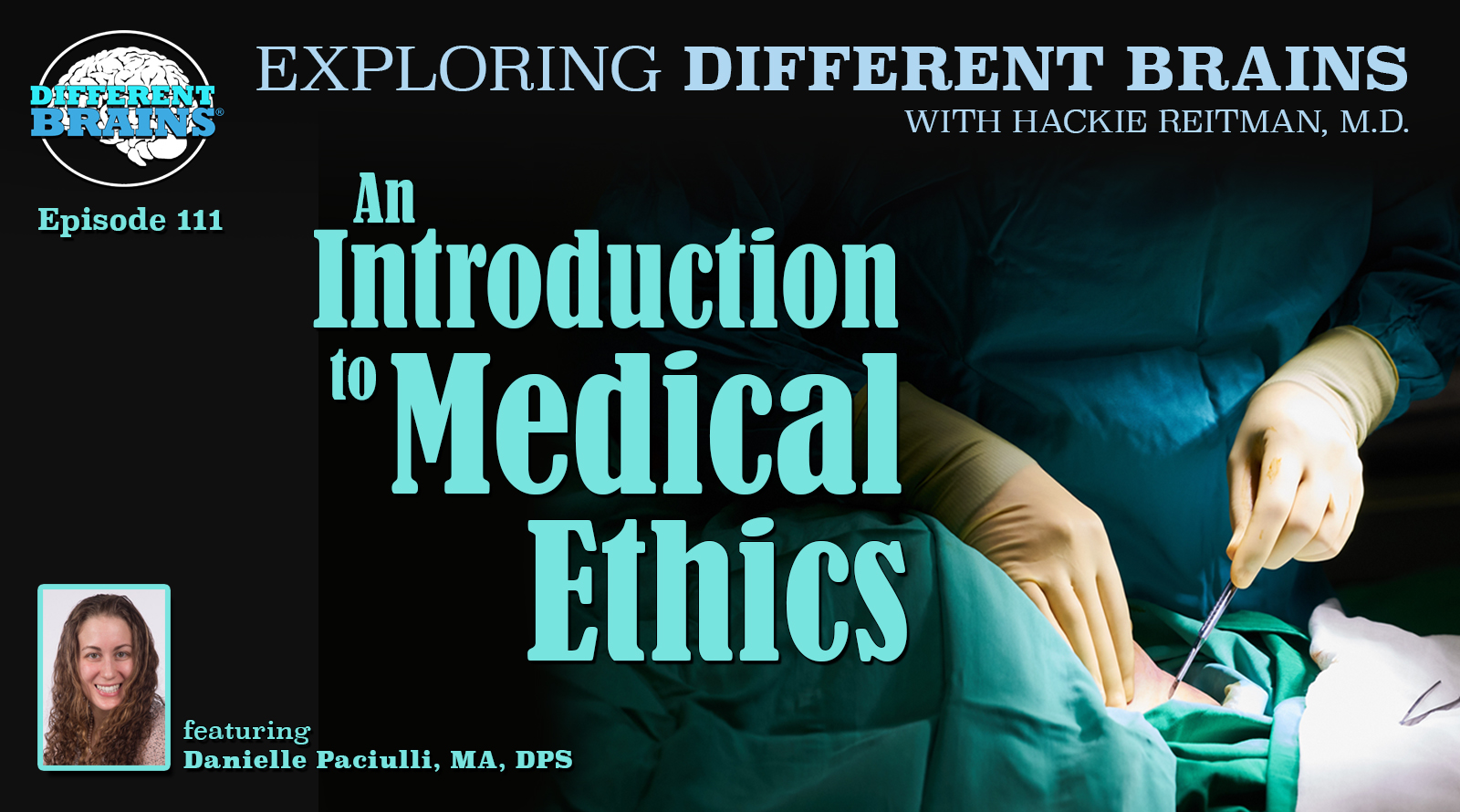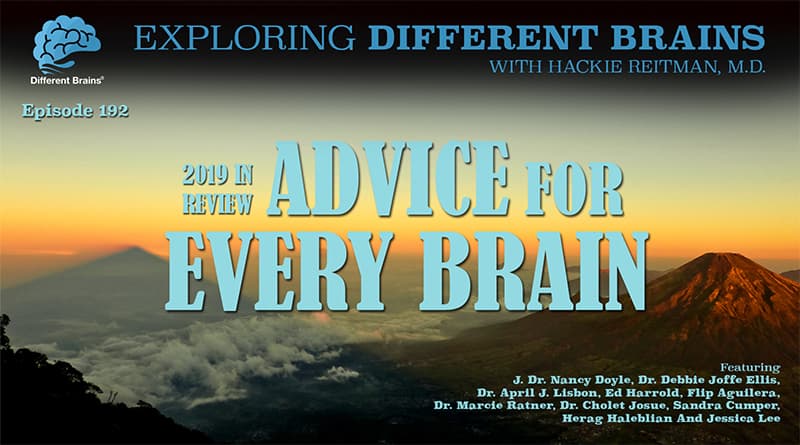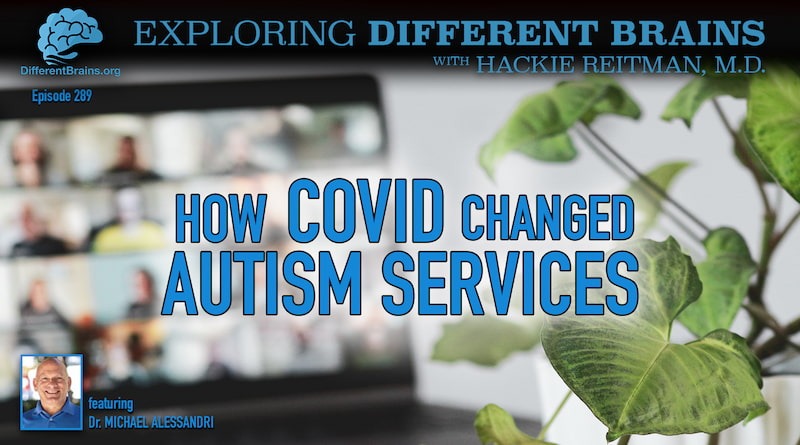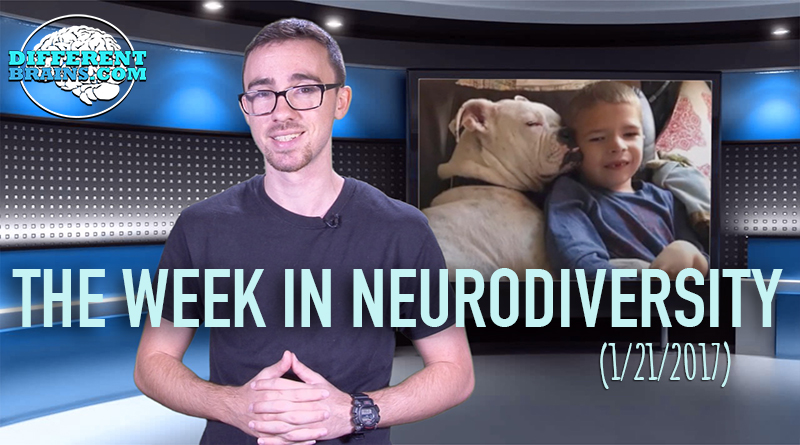
An Introduction to Medical Ethics, with Danielle Paciulli, MA, DPS | EDB 111
(18 mins) In this episode, Dr. Hackie Reitman speaks with Danielle Paciulli, MA, DPS, a Clinical Ethics Consultant in New York. Danielle discusses the four basic principles of health care ethics, and looks at two cases that exemplify the need for ethics in hospitals.
To contact Danielle, e-mail her at: dpaciulli@yahoo.com
.
88 Second Preview:
.
To listen or download the podcast version of this episode, see the embedded player below.
Or look for us on your favorite podcast provider:
iTunes | Stitcher | SoundCloud
[expand title=”View Full Transcript”]
HACKIE REITMAN, M.D. (HR): Hi I’m Dr. Hackie Reitman welcome to another episode of exploring Different Brains…and today we have my new friend Danielle Paciulli. Danielle you’re a medical ethicist and we’re going to learn all about it here at Different Brains. Thanks for being with us.
DANIELLE PACIULLI, MA, DPS (DP): Thank you for having me I’m very excited.
HR: Let’s start off where are you? Tell us where you are.
DP: Sure, so a brief intro of myself. My name is Dr. Danielle Paciulli. I have my doctorate in health policy, health ethics, and health care, specifying in bioethics. So I am currently a clinical ethics consultant at a hospital and I provide consultative services to patients, families, and clinical teams when necessary. So what that means is if there’s a conflict between multiple family members, between the patient and medical team I’m called in and I go over the ethical, as well as the legal rights of each case scenario. That’s provided for every patient and every family in the hospital.
HR: And you also deal with cases all over the world as well –
DP: Yes that’s true. I am on a few different types of boards and committees currently. One that I’m heavily involved in right now is the end organ pillaging, which is a committee in Canada and that just goes into organ donation and organ trafficking from China actually. We focus on the ethics behind that and how to make that more ethically favorable for individuals living in China…and no longer become prisoners who are then forced to donate their organs.
HR: Well I remember when I was commuting here from Fort Lauderdale up to Boston University, my Alma mater medical school for thirty years. We would hear stories in the cadaver labs about when cadavers were first starting out so to speak at the medical schools. They often times there was a lot of ethics involved in shady ethics in getting those bodies and many times they were going out and get them.
DP: Yes you know ethics allows for all different types of individuals living and non-living to get guaranteed and proper care…and it’s quite interesting that you speak about cadavers because that’s one area that I am looking more into now because it is getting more popular in the ethics committee regarding medical research on cadavers and their rights and limitations.
HR: Well I’m going to assume that our audience here at Different Brains, which is a pretty smart audience or as ignorant as I am in what a true professional medical ethicist does every day and so maybe the best way to do is for you to give us some examples of your most interesting cases without giving up any confidentiality of course. Letting us know some of the interesting things that we might not even think have anything to do with anything
DP: Sure. So before that, I do want to just provide a little bit more background information. So there are four values that clinical ethicists go by and they’re called autonomy, non-maleficence beneficence and justice…and this is again just to guide the medical teams, the families the patients, and myself to honor the patient wishes. To do what’s right by the patients and cover all aspects that maybe necessary. Clinical ethicists are available all over the hospital including the ICU the CCU, even the NICU which is the neo natal intensive care unit in case we don’t know what that is. So we are all over the hospital and we are gaining more popularity as more hospitals are creating a mandate for clinical ethicists to be present not just an Ethics Committee, which is in hospitals already, but a clinical ethicist some like me who has a master’s or a doctorate degree in training for this type of specific position. So I’m also paid to sit and talk with the family as I said and the medical team and figure out the scope of the situation is. What is going on and that really allows me to understand and unpack everything that may be going on that the nurses and the medical team may not be able to have the time to sit-down with the family and figure out what’s going on. What mom would have wanted, what brother or someone else would have wanted. So it is an important position and an important role, and I’m very happy to see that the US, especially a lot of hospitals are getting more on board with this position and realizing the need that not only the hospital can benefit from having someone like me as a clinical ethicist, but also the patients and the families of patients.
HR: Could you go over those four guideposts again you mentioned before.
DP: Of course. So the first one is autonomy. The second one is non-maleficence. Then we go into beneficence and justice and what those four really summarize is autonomy of a patient. Ensuring that the patient is given all of the guaranteed rights and values and looked at as a patient regardless of any other condition or background that they may bring. Non-maleficence is and beneficence is doing no harm to a patient and again ensuring the same principles of autonomy. Lastly justice, are we doing legally what’s right by the patient.
HR: Well you know and it’s very interesting that people forget that about the Hippocratic oath. Which is first do the patient no harm and sometimes we forget that
DP: Yes you know sometimes I’ve seen some cases, especially in ER, when you have to make a very quick decision and the doctor is doing what the doctor feels is best in that situation. Although the doctor may not be wrong, there is perhaps a little story behind family in the situation that may need some unpacking before we proceed with whatever procedure we’re going to receive.
HR: Let’s go back to some of the most interesting medical ethics cases you’ve ever had without disclosing any confidential information.
DP: Sure of course. So let’s see. The first case I can present is an individual with intellectual developmental disability. Now this patient was an adult. So an adult that means 18 and older, so you can make your own decisions when you’re an adult…but because this patient was developmentally disabled they had capacity to make some decisions but not enough to make a final decision. So what mean by that is in this particular situation this person was admitted to the hospital for something like a common cold the flu but it had gotten pretty severe. So therefore they had to be emitted into the hospital. Then the patient was no longer eating, didn’t want to eat, perhaps didn’t understand exactly what was going on, it was a little unclear…and if that’s the case then we get psychology involved to see where the patient lies. One of the dilemmas with that case is the patient would have been expected to make a full recovery had the patient cooperated and ate and took the proper medication and rested. However this individual did not want to eat so that was becoming an ethical dilemma. You can’t necessarily just force an individual to eat although it might be easier for some of us to think that at times. So, I was called into figure out what was going on and to see the gravity of the situation and really just understand why well didn’t this person want to eat, what was going on? So I’m sitting with this patient getting to know them and through our conversation I learned that the patient was a vegetarian and the meals that were being provided were meat based meals so they weren’t eating it. So it wasn’t simply that they were refusing food, which is what the doctors and the medical team had concluded, it was that they didn’t want to eat the actual food that they were given so once was able to have this conversation with the patient we were able to clearly identify the proper food that this person needed. Now this all could have been avoided with a quick and simple conversation and maybe some of you are wondering why this hasn’t happened previously, but I’m sure if you’re aware in a hospital at least nurses and doctors are in and out in the blink of an eye. They don’t necessarily have the available resources and time to figure out why someone may not want to eat and unpack that situation. For this particular case we did have healthcare proxy which is someone to make decisions on the patient’s behalf but we didn’t have to get that far because this person was out of state. So this patient was living in a group home setting and therefore we didn’t really have much information on their background or their history. There was some communications with the group home but that’s a different issue. So with those communication errors that we were experiencing we couldn’t understand again the patient not wanting to eat, but if we had a good communication with a group home perhaps they would have enlightened us that this patient was a vegetarian and you know this is what they prefer to eat on a daily basis. So that’s a pretty clean cut case is what I would consider.
HR: I assume that you interface significantly with legal counsel how does that work? What are the mechanics of that?
DP: Yes so we, we when I say we, I mean the ethics committee itself but I’m the clinical ethicist. We deal a lot with the legal department in the hospital as well as other committees in the hospital such as psychiatry if that’s necessary, patient advocacy. Any situation that could call for more people, more hands on deck so to speak would be better for the family and the patient. Again it’s all about the family and the patient but getting back to the legal aspect oftentimes it’s manageable without legal action. However, I am thinking of this one particular case where we did have to get the legal team heavily involved unfortunately. I’ll just quickly give that case if you don’t mind.
HR: Sure go right ahead.
DP: So this case was over the summer, it was a male in his 60s. He had a history of heart issues, he had some chest pain he went to a local hospital then he became unresponsive he had went into a coma while at this hospital and then had a heart attack while in the coma it was very very interesting. So in the end he got transferred to my current hospital. Now this has been going on for 30 days at this point by the time he got transferred again tests show that it does not look like he’s going to recover. There’s a lot going around his heart which I don’t need to get into because that’s not what my role is. All I need to know is the facts and the facts where his heart was not doing well it didn’t look like it was going to recover it’s already been 30 days and unfortunately the longer people are in the hospital the worse the outcome looks. So this family had a wife and it included seven children and the children were older I would say they were in their 30s maybe and they had the wife had health care proxy and so she was able to make the decisions for her husband but she wanted the family, meaning her children, to all help her and support her. There were six children living locally one child far away. The six children were with their mother day in and day out. They saw the situation with their father they were able to visually understand it comprehended. They call doctors they met with doctors and that’s different than the one family member who was far away sure they would speak to their siblings and their mother and even the medical team but it’s very different than when you see something happening in your eyes in front of you. So the mother and the six children had agreed to remove every technology device and just let nature do its course and let whatever happen happen because this individual had a g-tube which is a feeding tube to get nutrients because they weren’t unresponsive so they needed something. So everything was just planned to be removed until this one family member, one child came from living away, they came home and they were just very upset they weren’t present this whole past 30days now it’s 45 days into the hospital stay. They were just very resistant. They didn’t want this done they wanted more treatment, they thought the doctors or the nursing staff were giving up. So a few days passed they try to come to a compromise, they try to present all the findings and the tests and it just wasn’t going well. The patient had asked to have a moment with their father in the room. Why not seems harmless right. The patient locked herself and her father in the room and would not let anyone in. Was quite hostile at the medical team through the door. Now this patient had because they were in the CCU which is the critical care unit so they had their own room. That’s how they were able to close the door and they wedged it somehow to lock it and they weren’t letting anyone in. You had to call security to remove the patient because now the patient’s a family member was not doing what’s best for the patient. So we called security we ended up of course opening the door getting the family member removed from the premise because they were just becoming very outspoken and outlandish and ultimately it was not this person’s decision although the mother wanted everyone to be involved. Legally speaking it was not their decision and this is where the legal counsel came involved because although this person was no longer welcome on the property they had somehow and trust me unfortunately things go under the radar. This person arrived in the middle of the night because the following day it was agreed that all technology devices would be removed they arrived in the middle of the night again locked themselves in the room but it’s the middle of the night no one really knows, no one really sees, different staff everything. So early morning comes and it’s a made aware now this patient’s not allowed to be on this property, which is the hospital property, at this point. So then we have to call the local police to get involved and properly remove the individual. They then would be resistant with the police with our security staff and again we had to get legal counsel involved. Have them sit-down with this person who was quite resistant in the family and just explained to them their ramifications if they were to continue and to be this resistant and that they should just cherish this remaining time with their father. So that’s where ethics and legal had to work together for a situation and this was a quite dramatic situation in the.
HR: Danielle I’m sure a lot of our audience are going to want to get in touch with you, how do they get in touch with you and learn more about you?
DP: Sure. So if you would like to get in touch with me specifically we can get my email out there I have no problem. I’m very responsive to emails. I do just want to put a disclaimer out there depending on what state you are in there are different answers. So I may be I’m pretty well-versed for New York in the tri-state area. However, on this call that I was just on, I was with an individual from Utah. So for example I don’t know about the laws as much in Utah. So with that disclaimer I will be happy to answer any of your questions you might have.
HR: Well Dr. Daniela Pacuilli, thank you so much for being with us for this episode of Exploring Different Drains thank you.
DP: Thank you so much
[/expand]
.
Different Brains® Inc. founder Harold “Hackie” Reitman, M.D. is an author, filmmaker, retired orthopedic surgeon, former professional heavyweight boxer, the past chairman and president (and current board member) of The Boys and Girls Clubs of Broward County, and a neurodiversity advocate. However, it was his role as a father that led to the creation of the DifferentBrains.org website.
Hackie’s daughter Rebecca grew up with epilepsy, 23 vascular brains tumors, and underwent 2 brain surgeries before the age of 5. Her struggles and recovery put him on the road to, through 26 professional heavyweight boxing matches, raising money for children’s charities (to which he donated every fight purse).
Rebecca eventually went on to graduate from Georgia Tech with a degree in Discrete Mathematics, and Dr. Reitman wrote and produced a film based on her experiences there (The Square Root of 2, starring Darby Stanchfield of ABC’s Scandal). After graduation, Rebecca received a diagnosis of Asperger’s syndrome. Hackie, shocked at his own ignorance of the topic despite being an M.D., embarked on years of research that culminated with his book Aspertools: The Practical Guide for Understanding and Embracing Asperger’s, Autism Spectrum Disorders, and Neurodiversity (released by HCI books, publishers of the Chicken Soup for the Soul series).
This experience revealed to Hackie the interconnectedness of the conditions that fall under the neurodiversity umbrella, while alerting him to the in-fighting and fractured relations that often plague the organizations tasked with serving the community. Convinced that overcoming these schisms could help all of society, Hackie forged the Different Brains philosophy of inclusive advocacy: “Supporting Neurodiversity – From Autism to Alzheimer’s and All Brains In Between”.
In the company’s initial years of operation, Hackie self-financed all of the content on DifferentBrains.org, all of which offered free to view to the public. Currently he is the host of our weekly interview show Exploring Different Brains, writes blogs for the site, and tours the country speaking at conferences, conventions and private functions, all with the goal of improving the lives of neurodiverse individuals and their families, and maximizing the potential of those with different brains. Separate from Different Brains, Hackie is the founder and CEO of PCE Media, a media production company focusing on reality based content. He recently co-executive produced the documentary “Foreman”, the definitive feature documentary on legendary boxer and pitchman George Foreman.




